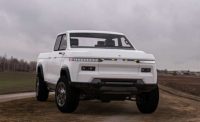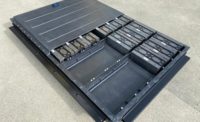One of the main issues in the recent strike against General Motors revolved around the increasing electrification of automobiles. The shift to electric- and hybrid-powered vehicles is expected to radically alter the shape of the auto industry in the decade ahead. It will also change the look of assembly lines.
Traditional power trains have as many as 2,000 electromechanical parts. In sharp contrast, all-electric drivetrains can have as few as 20 components. As a result, assembling an electric car involves approximately 30 percent less effort than one powered by a traditional internal combustion engine.
That sobering statistic has sent shivers up the spine of the United Auto Workers union. In fact, it recently released a 38-page report on the topic entitled “Taking the High Road: Strategies for a Fair EV Future.”
Among other disruptive implications, the UAW report warns that “the nature of EV production could also threaten employment levels in the automotive industry. This is due to the much lower mechanical complexity of EV power trains.”
During the next four years, automakers plan to unveil more than 100 electrified products. In 2020, BMW, Daimler and Ford alone will roll out a slew of vehicles, including plug-in hybrid variants of existing models.
They’ll be joined by all-electric startups such as Faraday Future, Polestar and Rivian. The latter is currently in the process of converting an old Mitsubishi plant in Normal, IL, to produce a line of electric pickup trucks and sport utility vehicles.
“A rapid increase in EV nameplates is the catalyst behind the projected growth throughout the next decade,” says Devin Lindsay, power train analyst at IHS Markit. “While relatively successful models such as the Tesla Model 3 mature in the market, traditional automakers will be rolling out not just one EV as we have seen in the past, but multiple models off dedicated platforms.”
This month, Volkswagen AG plans to begin assembling its much-anticipated ID.3 vehicle at a factory in Zwickau, Germany. The company has converted an entire plant from producing 100 percent internal combustion cars to 100 percent electric vehicles.
Volkswagen’s Porsche division also recently modified a factory in Zuffenhausen, Germany, to produce the high-performance Taycan, an all-electric sedan powered by lithium-ion batteries capable of generating up to 620 hp.
The Taycan will be assembled in a “factory within a factory” as part of the Porsche Production 4.0 initiative, which emphasizes smart, lean and green manufacturing.
‘Smart stands for flexible and connected production,” says Albrecht Reimold, a member of the Porsche executive board responsible for production and logistics. “Lean means responsible and efficient use of resources. Green refers to sustainability and environmental protection.
“This will enable [us] to combine the advantages of the traditional principle of continuous production with the flexibility of versatile assembly,” Reimold points out. “It will also allow the number of work cycles to be increased using the same amount of space.”
Instead of a traditional, rigid assembly line with shear plates embedded in the ground, the new production system uses automated guided vehicles that automatically move from station to station.
“This makes the production even more flexible [and] individual customer requirements are even easier to implement,” explains Reimold. “That gives us more freedom not only in our production operations but also in the architecture of our new plant.
“The flexi-line offers enormous benefits in terms of both investment and flexibility,” claims Reimold. “We saved around 30 percent of the investment costs by not setting the conveyor system into the foundation. And, because the line isn’t rigid, we can modify it at any time, integrate new elements or do bypasses to meet special customer wishes.”



